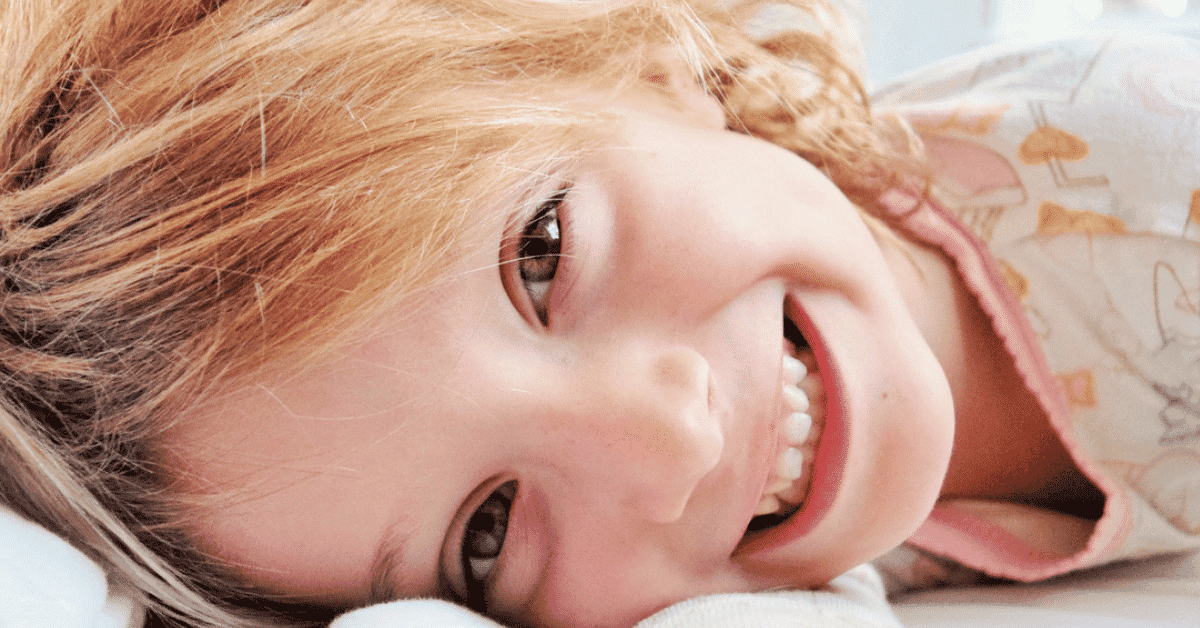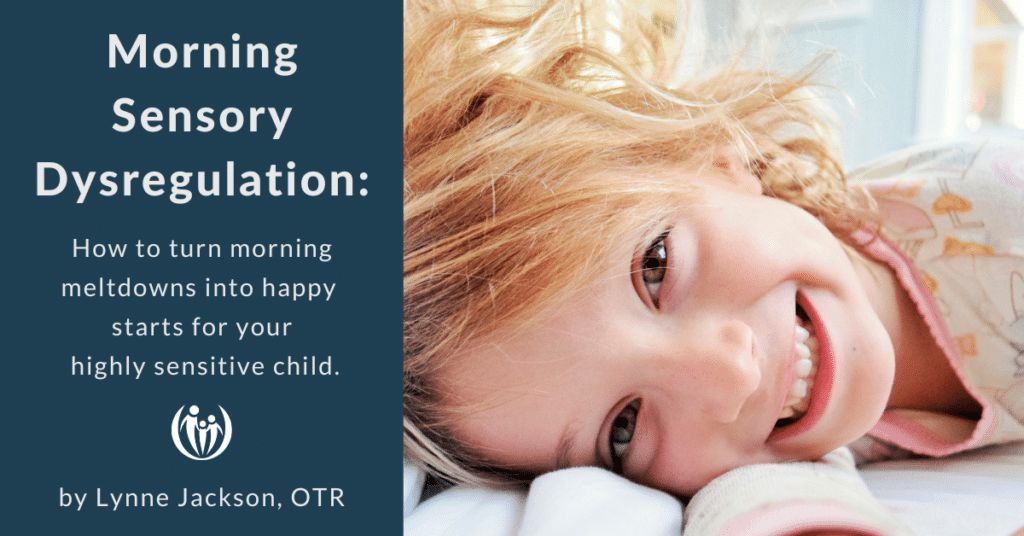
Morning Sensory Dysregulation
How to turn morning meltdowns into happy starts for your highly sensitive child.

Your child might be one of the kids who struggle to wake up on the “happy side of the bed.” If your child often seems “off” when waking, you’re not alone. Morning sensory dysregulation is real. One day your little darlin’ is sweet as can be, but the next day you sense it will be “Meltdown Morning.”
On other days your child might be sluggish and difficult to rouse. Some kids start the day prone to an outburst until they get a decent breakfast. But the challenge of getting them to the table to eat can be overwhelming. When your child’s day starts off rocky, it is sometimes difficult to regain balance, but it is possible.
How will my child awake this morning?
Over the years, many parents I’ve coached have expressed their anxiety, “Which child will greet me this morning?” Remember…kids don’t wake up and consider, “Do I want to make life easy or miserable for my parents today?”
Children with erratic behavior usually have sensitive nervous systems that magnify many different stressors. These stressors may include:
- how they slept
- how over-stimulating their previous day might have been
- what they ate yesterday
- what their emotional stressors are (i.e., anxiety about school)
Their nervous system is delicately balanced, and it takes very little for them to become dysregulated.
What is sensory dysregulation?
Processing sensory information is a very complex task. Our brains process millions of bits of sensory information every second. We have to select (for example: enhance important info and dampen or ignore unimportant info), coordinate sensory systems together, and interpret or assign meaning to sensations.
When this system is functioning smoothly, it is “well regulated,” a child’s body feels good, and their world all makes sense and might even feel inviting. Getting up and moving will probably be pretty easy.
But, when the system is not functioning well, a child may experience aversive sensations and feel anxious, disorganized, and overwhelmed by the world around them. They may have low muscle tone that makes it hard to get out of bed, or they may need lots of movement to help them feel more in control of their situation.

Do you have a child with BIG feelings and BIG needs?
The Sensitive & Intense Kids online course is a game changer. It’s for YOU.
Put yourself in their shoes
A starting place is to recognize what it’s like to be your child. When kids are prone to dysregulation in the morning, their sensory perception of the world is often intense and unpleasant – their clothes might feel awful, sounds might be harsher, and your coffee breath might be overwhelming. They probably feel agitated, stressed, and out of control.
When kids feel this way, a natural coping strategy is to attempt to control those around them in order to feel a little more sane.
Parents who are willing to experiment with ways to help their child feel better and regulate (stabilize) their stressed nervous systems will make life easier for all.
Let’s look at how the Connected Families Framework messages can help these kids:
- You are SAFE with me: If a child senses your anxiety about her mood, it creates a spiral of anxiety and tension between you. So remember, morning challenges do not mean that you are a bad parent or your child is a bad kid! If you shift to a goal of solving the underlying problems instead of controlling behavior, your child senses you are for her, not against her. This makes a huge difference as you engage more peacefully, and your child feels safe with you.
- You are LOVED no matter what: Humor and affection can greatly ease kids’ anxiety and stress in the morning. One dad said, “If I could get Anders laughing, the whole morning would go better.” I often roused our sensitive daughter with a silly little song I’d made, starting with “You’re my girly-girl-girl, whom I lovey, love, love… The whole thing took less than 10 seconds, but it really helped because it intensely communicated, “You are loved and enjoyed!”
- You are CALLED and CAPABLE: Problem-solving your morning challenges with your child communicates he is capable of figuring out what he needs in order to be successful. Knowing this, at a non-stressful time, discuss: “When things go better in the morning, what does Mom or Dad do that’s helpful? What do you do that makes your morning better? How could we all do those things more often?”
- You are RESPONSIBLE: When your child chooses an activity, you can say, “You listened to your body telling you what it needed this morning.” Then celebrate and talk about it, “When we take care of our bodies in the morning, it helps us have such a great day! You’re learning how to help your body feel better so you can do your best.” This meets that need for healthy power and builds an identity of independence and responsibility.
Additional ideas to communicate “You are CALLED and CAPABLE”:
Pay attention to your child’s cues. Be a listener and a student of your child as you develop practical ideas together for your mornings. When you find sensory activities that match your child’s needs, his sensitivity to the activities will make them powerfully helpful. Your day will start much better if you figure out how to work with your child’s sensitivity instead of against it.*
For younger kids who need to be empowered in a concrete way, you can draw simple pictures or take photos of your child doing helpful morning activities (see below) and let them choose from a few options. Problem-solving together or offering a few picture choices to help kids’ bodies feel better provides the “healthy power” kids need to not meltdown or control others.
Here are a few ideas to get you started:
- Blood sugar/hydration: A drink with electrolytes first thing in the morning can really help kids if they are sluggish; what it does for muscles, it can do for the brain. Similarly, if your child frequently struggles until she eats breakfast, try greeting her with a light snack or a little fruit in the morning to get enough nutrition in her system to get through the morning routine. It made a huge difference for one family to simply shift breakfast to the first thing in their routine.
- Massage can make a big difference in the morning, even if it’s just a one-minute back rub. If your child doesn’t like massage, see the Sensory Input Techniques demonstration video for many ideas. Whatever you do, be sure to make it affectionate and fun.
- Big, fun muscle activities are powerful “regulators” for dysregulated kids. Lift a small child by the hands and bounce her to the bathroom or kitchen table. Or challenge your child to get where he needs to go by jumping like a frog or hopping on one foot. Make a game of hiding their socks and get kids going up and down the steps as you give clues.
- Music: Music is a great way to set the tone for the morning. Whether your child needs to be calmed or energized can dictate what type of music you play. What kind of music does your child enjoy that can help do that?
*An important tip: Do not command kids when they struggle to use sensory strategies because your intensity will probably increase their stress, not relieve it. Instead, stay calm as you do plenty of modeling of calming strategies yourself. You can gently invite your child to do anything they think would help them feel better (“i.e., If you want, you can…”), and then give lots of encouragement for any small helpful efforts.
Questions to ask yourself:
- How could I help my child feel safe and loved in the morning?
- From the list above, what stands out to me in this list of sensory-based ideas?
- How could I engage my child in figuring out what his body needs, so he can feel good and be successful in the morning?
As you engage with your child with understanding and compassion when they struggle in the morning, you represent the grace and mercy of Jesus! And, no matter how anyone wakes up in the morning, this holds true…
“The steadfast love of the Lord never ceases; His mercies never come to an end; they are new every morning; great is your faithfulness.” Lamentations 3:22-23
© 2023 Connected Families

Do you have a child with EXTRA needs?
Parenting isn’t easy, but when you’ve got an extra INTENSE or SENSITIVE child with big feelings… it’s even harder.
The Sensitive and Intense Kids online course will equip you to parent well, even with these unique kiddos.




